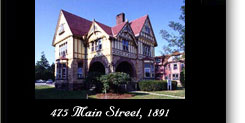
21 day debate journey from Vermont to Missouri to Serbia to Slovenia and back to Vermont, January, 2003
| Part One | Part Two | Part Three | Part Four | Part Five | Part Six | Part Seven | Part Eight | Part Nine | Part Ten |

PART ONE: BACKGROUND & PREPARATION
BACKGROUND
 The
Lawrence Debate Union is an endowed co-curricular program at the University
if Vermont. Active since 1899, the LDU trains students in debating and enters
them in competitions all over the world. The LDU participates in USA policy
debate sponsored by the Cross Examination Debate Association, the National Debate
Tournament, and the Society Advocating More and Better Argumentation. Last year
the LDU was in almost 900 debates, finished ninth in the national sweepstakes
race, held numerous public debates, presented over 25 television programs, and
engaged in numerous outreach activities. I am lucky enough to be the director
of the LDU.
The
Lawrence Debate Union is an endowed co-curricular program at the University
if Vermont. Active since 1899, the LDU trains students in debating and enters
them in competitions all over the world. The LDU participates in USA policy
debate sponsored by the Cross Examination Debate Association, the National Debate
Tournament, and the Society Advocating More and Better Argumentation. Last year
the LDU was in almost 900 debates, finished ninth in the national sweepstakes
race, held numerous public debates, presented over 25 television programs, and
engaged in numerous outreach activities. I am lucky enough to be the director
of the LDU.
I have been a debate coach at the university level since 1972 and I starting
coaching high school debate in 1970. Since 1995 I have been involved in promoting
debate in nations other than the USA.
We have traditionally
taken a long debate trip during the break between the fall and spring semesters.
Students return to campus right after Christmas, work 9 AM-5 PM preparing for
the rest of December, and then after new year we drive from Vermont to Kansas
City (27 hours). In Kansas City we attend two three-day debate tournaments and
then we drive home (another 27 hours). We generally use this trip as a way to
dramatically raise the performance of our younger debaters through the days
of preparation and then we enter them in higher divisions at the tournaments
so that they can learn from their competition.
The preparation days involve the same sorts of activities. We do speaking drills,
have practice debates, work on files, do research, have strategy meetings, etc.
Because USA policy debate involves one topic that we debate for an entire year,
and because it is allowable to read quoted material in the debates, research
and preparation are critical for success. This year the topic is, resolved:
that the United States federal government should ratify or accede to and implement
one or more of the following: Kyoto protocols, Strategic offensive Reduction
treaty, International Criminal Court, Comprehensive Nuclear Test Ban Treaty,
Second optional protocol to the Rome Convention banning the death penalty. The
affirmative team picks one of these treaties to have the USA adopt, and the
negative opposes that.
Policy debates in America are very complex, high-speed affairs full of argumentative
jargon and intellectual shorthand. The time limits are as follows:
First affirmative constructive 9 minutes
Cross-examination 3 minutes
First negative constructive 9 minutes
Cross-examination 3 minutes
Second affirmative constructive 9 minutes
Cross-examination 3 minutes
Second negative constructive 9 minutes
Cross-examination 3 minutes
First negative rebuttal 6 minutes
First affirmative rebuttal 6 minutes
Second negative rebuttal 6 minutes
Second affirmative rebuttal 6 minutes
Each team also has 10 minutes of preparation time to use as they please during
the debate, usually before they speak.
| Work is intense preparing for the trip |
Policy debates, as you can see, take a long time. Usually there are 30 to 45
minutes of time between the release of the pairings and the start of the debates.
As well, the judge will take 15 to 20 minutes to decide and then have a 15 to
20 minute discussion with the debaters after revealing the decision. This, a
full debate will take over 2.5 hours. With four debates in a day, that is a
long and tiring process. Yet, people seem to love it and flourish within this
tense and trying setting.
This year we are taking four teams on this trip. We did have five but one had
to drop out at the last minute because one of the team members did not meet
his work and preparation obligations. We have several coaches and alumni who
would also be taking the trip to help out.
Our preparation was productive and fun. We worked all day and the students often
got together in the evenings to socialize, but some to continue working. We
broke up a little early on December 31 so that we all could celebrate.
We were also involved in preparation for the parliamentary tournament in Belgrade.
I worked with the students and we had several practice debates. These students
are trained policy debaters, and so needed to learn the different style and
technique involved in NPDA parliamentary debating. I even debated against them
twice to get them ready. It was quite enjoyable.
| Michael Malone. Kayce Massey | Jillian Marty, our President |
| Helen Morgan leads speaking drills |